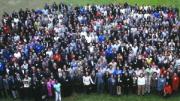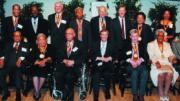For its first "Celebration of Black Alumni," organized by Kirkland and Ellis professor of law David B. Wilkins '77, J.D. '80, the Law School invited more than 1,500 graduates to return to Cambridge on September 22 through 24, and some 600 did. Wilkins envisioned an event that would "set the tone for how America addresses issues of race, law, and educational opportunity for years to come."
On Saturday morning, President Neil L. Rudenstine told the audience that such a gathering could not have occurred a decade or two ago, because there were too few alumni to show up. He then made a passionate case for diversity on campus.
That evening, the gala culminated in the conferral of the first Harvard Law School Medal of Freedom on 12 surviving members or relatives of the Brown v. Board of Education litigation team. In making the presentation, Conrad K. Harper, J.D. '65, of Simpson Thacher & Bartlett, who became the first black member of the Harvard Corporation last summer, said, "To have tied the thong of the sandal of those who worked on that historic case would be honor enough for a lifetime." Then, "So that their names may echo within us," he read in alphabetical order "the roll call of glory."







